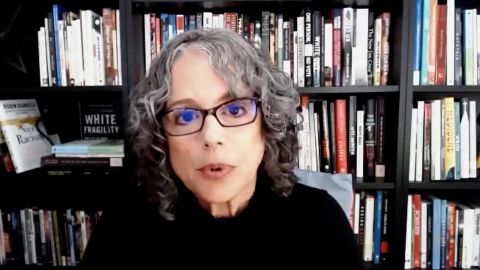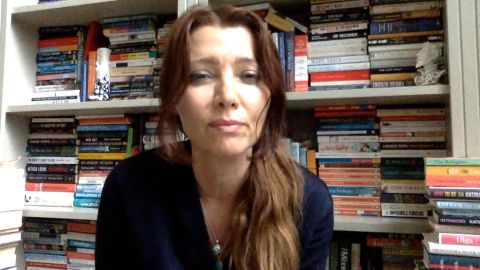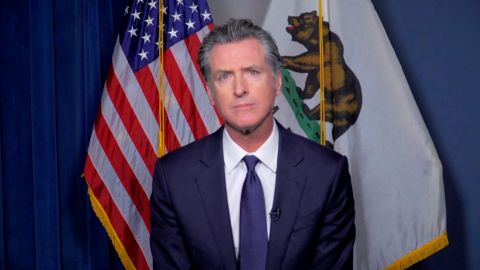Read Transcript EXPAND
CHRISTIANE AMANPOUR: Our next guest is the anti-racist educator Robin DiAngelo, famed for her best selling book, “White Fragility”. DiAngelo’s work aims to educate white progressives on the part they play within a racist culture. It’s the theme she continues in her newest book, “Nice Racism”. And here she is explaining her work and the criticism that’s been leveled against her to Michel Martin.
MICHEL MARTIN: Thanks, Christiane. Robin DiAngelo, thank you so much for joining us once again.
ROBIN DIANGELO, AUTHOR, “NICE RACISM”: I’m so happy to be with you, Michel. Your first book, “White Fragility” was published when, I think, June of —
DIANGELO: 2018.
MARTIN: — 2018. It spent more than a year on the bestseller lists. There was another resurgence of interest after last summer social justice protests, your latest book, “Nice Racism”. What is this book do, the second book do that the first one did not? What was your goal with this one?
DIANGELO: The first book set out to establish the existence of systemic racism. This book starts from that premise. It starts with the assumption that my readers are with me. I’m not having to prove the existence of systemic racism and they want a deeper dive. There was a very provocative question, or excuse me, statement that I made in “White Fragility” that I get asked about a lot, and that is that white progressives may, in fact, cause the most daily harm across race. And this book set out to answer how we do that.
MARTIN: Why nice racism? What’s nice racism?
DIANGELO: Well, I hope that it grabs your attention because it seems like an oxymoron. But it’s the kind of racism that is behind a smile, or the assumption that the presence of niceness or a culture of niceness is an indication of the absence of racism. And I would argue that racism can and does flourish in a culture of niceness, because culture of niceness tends to be one that assumes the white experience as universal. It’s a conflict avoidant culture where issues that cause discomfort are seen as some kind of breach in the social contract. It tends to be more passive aggressive, and just harder to get your hands on, there’s more gaslighting. It’s the more subtle end of that continuum of racism.
MARTIN: One of the things that I found striking about the book is really at the very beginning, your argument is that actually you think kind of nice racism causes more daily harm to people of color than the sort of overt aggressive kind. So tell me why you say that nice racism is actually you think on a day-to-day basis could be more pernicious.
DIANGELO: Yes, and insidious. Let me be clear, not to downplay the impact of really explicit racism and the impact of voter suppression and the legal blocking of us being able to just acknowledge the existence of racism is a very, very serious, very powerful and effective backlash. But it’s easy to get your hands on, it’s very clear, and it’s also easy to avoid people who would stand behind those kinds of acts. So on a daily basis, and since we’re being direct and blunt, Michel, you’re in a classic, white progressive environment and institution. On a daily basis, you likely do not interact with white nationalists or people who would profess explicit racism. On a daily basis, you interact with me and people just like me. And the theme that I hear over and over, particularly from black people who are in overwhelmingly white environments is exhaustion. And not just exhaustion from, you know, daily work, but the exhaustion from that culture of niceness that covers up and makes it harder to talk about, the more subtle — I’m going to put air quotes — subtle to me, slights and indignities, the unexamined assumptions about your qualifications or how you got your job, or the resentment simmering just under the surface that I hear quite often from white people talking about diversity hires, or we had to and that’s why. You know, that that creates a culture too that can be debilitating.
MARTIN: Give an example. I can give one, you can give one. I give one, being the — what recently happened at ESPN, the Sports Network, where a white correspondent was overheard making comments about her disappointment that a black colleague of hers had had a kind of a high profile position covering basketball. Then she said, look, I totally get that they need to deal with their diversity problems, but not at my expense. And its causes huge internal upworthy, African American correspondent wound up leaving the network after that. Obviously, I’m not privy to all the internal sort of, you know, discussions that went on, but is that an example of what you’re talking about?
DIANGELO: I think it’s a great example, because we have kind of a two part move. The first move is I’m all for diversity, right? So this isn’t somebody who’s coming out and saying we shouldn’t have diversity. And yet the but which has much more weight is you won’t do it on my back, if you will. And so, now you have white feminism, the kind of resentment that white women can feel, because patriarchy is real. Sexism and misogyny are real. And sometimes our resentment about that, our sense that we’re not being seen or heard can translate to us not being open to where we’re not seeing or hearing somebody else. So she expressed that resentment that I’m talking about that somehow you have to rather than seeing it as an enhancement or contribution.
MARTIN: Just sort of stay with that as an example, if you don’t mind. Why did she allowed to have her feelings too?
DIANGELO: Well, I mean, of course, she’s allowed to have her feelings, but it does translate into the climate, it’s going to come out in some kind of way. If I am your co worker and I basically resent you, and see you as kind of taking something that is inherently mine, you’re going to feel that for me, it’s going to impact the workplace, it’s going to — I will probably undermine you in ways that I might not even be aware that I’m doing so. And I’m pretty sure, and you can check me if I’m wrong, then you can feel that from me, right? And that it impacts you as you do your job.
MARTIN: It’s interesting because, you know, your books for some people, obviously, they haven’t been bestsellers for as long as they have for no reason. Because obviously some people feel like, yes, it just brings a sense of peace. It’s comforting. It’s like you realize, oh, I’m not crazy. These — I really am experiencing these things. But for some people, they just seem to find it infuriating. And I’m just curious about what you think is behind that fury.
DIANGELO: Yes. If you can’t let go of that idea that it’s a moral issue, it’s a matter of good people versus bad people, you’re going to be infuriated by it. You’re going to think that somebody is saying that you are an immoral person. And you’re not going to understand that, it’s going to feel like an unfair accusation. And I’m with you, I find it incredibly freeing and liberating. I don’t find it at all guilt enhancing. You know, it just kind of like moves you past all of the defensiveness into a place of deep self-reflection. And so, I think that’s a piece of it for people who are hanging on to this idea of either or. Apparently, a lot of white people think that if you can talk to black people calmly, you can’t be racist. You know, this idea that proximity is proof. And this is another way that I think nice racism manifests is the urgency that many of us feel who are white to establish as quick as possible that we’re not racist. And all of the ways we seek to establish that are pretty much not convincing. The evidence we offer up is kind of ridiculous.
MARTIN: Like what? Like what?
DIANGELO: Like I can’t be racist, I marched in the 60s. I can’t be racist. I had a black roommate in college. I can’t be racist, I work on a really diverse team. I’ve heard people say, I’m not racist, I’m from Boston. I speak several languages. I mean, it does beg the question, what do you think racism is that this would, you know, ensure that you’re free of it? You know, Harvey Weinstein was around women all the time. He was married to a woman, that that mean he couldn’t have some socialistic orientation to the world. And that while he didn’t assault all women, I imagine if I was around him, I would pick up on it.
MARTIN: You know, on the other hand, I have to say some of the more stinging critiques that I’ve seen have come from people of color, is that in trying to point the finger at white people that you dehumanize and flatten out black people in particular people of color, that people of colour become sort of the moral authority. They are the ones who are the wise ones, they are the ones who are the ones who sort of gift everyone with their moral sensibility. And that that’s kind of racist in its own way. But what do you say to that?
DIANGELO: What do —
MARTIN: I mean, black people can be jerks too, right?
DIANGELO: Absolutely.
MARTIN: Black people (INAUDIBLE) —
DIANGELO: Right.
MARTIN: — self-absorbed, narrow minded, bigoted, jerks, too.
DIANGELO: There have always been black people who will claim that racism doesn’t exist, and they rarely ever experienced it, that, you know, the problems that black people have are brought upon themselves, and they will be embraced, and their voices will be amplified. And so, I don’t take that as seriously and as I take somebody who has a record and a commitment to anti-racism critiquing me. So let’s move to those folks. And absolutely, it’s the master’s tools dilemma. And I’m actually at a place where I’m wondering why anyone thinks any one person could get this right. And get this right by everybody, and is responsible to get it absolutely right by everyone. Of course, there are going to be critiques. And yes, in a way, I do see that I’m asking white people to basically defer. And that’s because most of the white people, my audience, have not or could not answer the question, what does it mean to be white? And if you’re at that place where you’ve never even thought deeply, I don’t think you’re in a position to determine what is legitimate and what is not legitimate? You know, what is valid to what you’re sharing about your experience, and what isn’t. And, you know, does it hurt to differ? Does it hurt to just listen openly and consider the possibility that what this person is sharing with you.
MARTIN: You’re not the first white person to write about racism from a white perspective, and to direct your writings to other white people. I’m thinking about a number of people. I’m just wondering why you think people come at you so hard.
DIANGELO: No.
MARTIN: And I wonder if you think gender is part of it, or why do you think people have come at you so hard?
DIANGELO: I do think gender is part of it. I expect my ideas as an academic and my theories and my analysis to be engaged within questioned, but it’s the personal, there’s been a lot of personal vilification that is not typical when somebody writes a book and, you know, makes a provocative argument.
MARTIN: No wonder (ph).
DIANGELO: And I think gender is a piece of that. And I do want to say that over the past five years, there have been 32 books about race on the New York Times bestseller list, and 29 of them have been written by black people, and only three by people who were not black, and one of them is me. A couple of those books have been on longer than my book. So it’s simply not true, that people aren’t listening to black people on this topic. And, you know, I’m speaking to the majority of folks who perpetuate this problem.
MARTIN: To me, if you worry about critical race theory, as you and I are speaking now, there’s been this tremendous effort to — by some states to outlaw the teaching of issues around race, and class, but mostly race, in school districts around the country. I don’t want to give a number because that may be wrong by the time people hear this conversation, but I think at least a dozen states now are moving to either outlaw the teaching of critical race theory or to regulate how teachers can talk about kind of race in class, in school settings, to take certain books off the shelves, for example, in school libraries. What do you think that’s about?
DIANGELO: And let me just say it’s stunning and terrifying. And I think it really speaks to where power lies that that quickly actual laws could be on the books. Summer of 2020 was really different, had been a long time since you saw that kind of galvanization from white people and the backlash has been swift and powerful. We have always manipulated what the white populace through animus and anti-blackness, you know, the southern strategy is tried and true. And critical race theory is the perfect new Boogeyman, right? It’s just vague enough to, you know, sound scary, and because really it just means critically thinking about the origins of such persistent racial inequality. I’m not a critical race theorist and that it truly comes out of legal scholarship, but I am according to this kind of Boogeyman approach, and that what they’re really talking about is anyone who says that systemic racism exists. Anyone who says that it’s our country was built on it, and it’s in the foundation. That is someone who’s going to be labeled a critical race theorists.
MARTIN: One of the bills, for example, moving through the Texas Legislature says that students shouldn’t have to talk about something if it makes them uncomfortable. What’s your best argument to white people about why they should make themselves uncomfortable?
DIANGELO: Well, I would ask two questions. One, who does it serve, or what does it serve not to have this conversation? This is not neutral or benign. Who’s made uncomfortable by this conversation, right? And I would ask, is there any other social ill that we would argue, the best approach to that social ill is to never speak of it? Suicide, bullying, eating disorders, sexual assault? Would we argue that we should never speak about those things? I don’t think we would. So there’s something different here, and I think it’s about deeply vested interests. I do think that white middle and upper class parents who believe that their children should have the best of everything, are in large part leading some of this backlash against looking at racial inequality in schools, right? Anything that would cause their children not to have access to the best will be perceived as a threat, or to cause their children to feel uncomfortable. But researchers really shows that after young people do so much better when they’re equipped to engage in conversations like this, when they have information. And they’re prepared to understand the world in a way that makes sense to them, and that they can actually act in the world.
MARTIN: How do you want this book to be used, if I could put it that way?
DIANGELO: Well, we did build into it a reflection questions. So, as a guide to keep trying. keep struggling, to stay engaged, to find some kind of inspiration and some sense, yes, some sense of guidance, right. Because this is hard, this is hard. And let me just be really clear, two key things. As a white person, I live, love, work, create every single day in a racist culture in which I’m comfortable. I am comfortable in a racist culture. I’d like to change that, right? If that discomfort helps bring some of that racism down, then it’s actually a good thing. And as a white person, I was never meant to know or love black people. You know, let’s be honest, white people, in large part, measure the value in the status of their environments, their schools, their neighborhoods, by the absence of any significant number of black people. That’s pretty deep, right? And we’re not going to challenge that and build those relationships and see humanity in one another if we continue to live in segregation.
MARTIN: Robin DiAngelo, thank you so much for talking with us.
DIANGELO: Well, thanks for having me.
About This Episode EXPAND
California Governor Gavin Newsom discusses COVID, wilfires and his recall election. Elif Shafak discusses her new book “The Island of Missing Trees.” CNN correspondent Fred Pleitgen gives an update from Iran. Anti-racist educator Robin DiAngelo discusses her new book “Nice Racism.”
LEARN MORE



